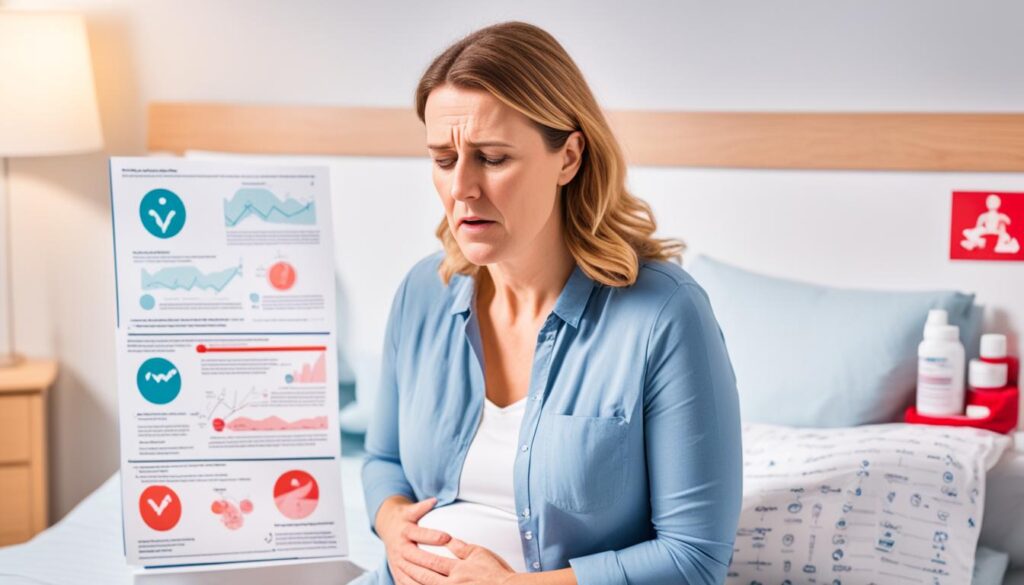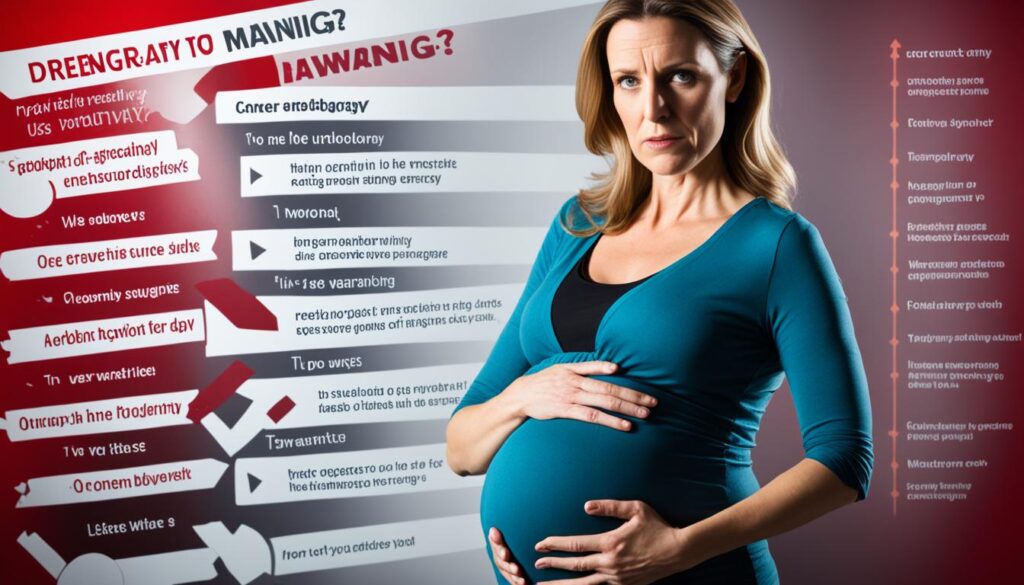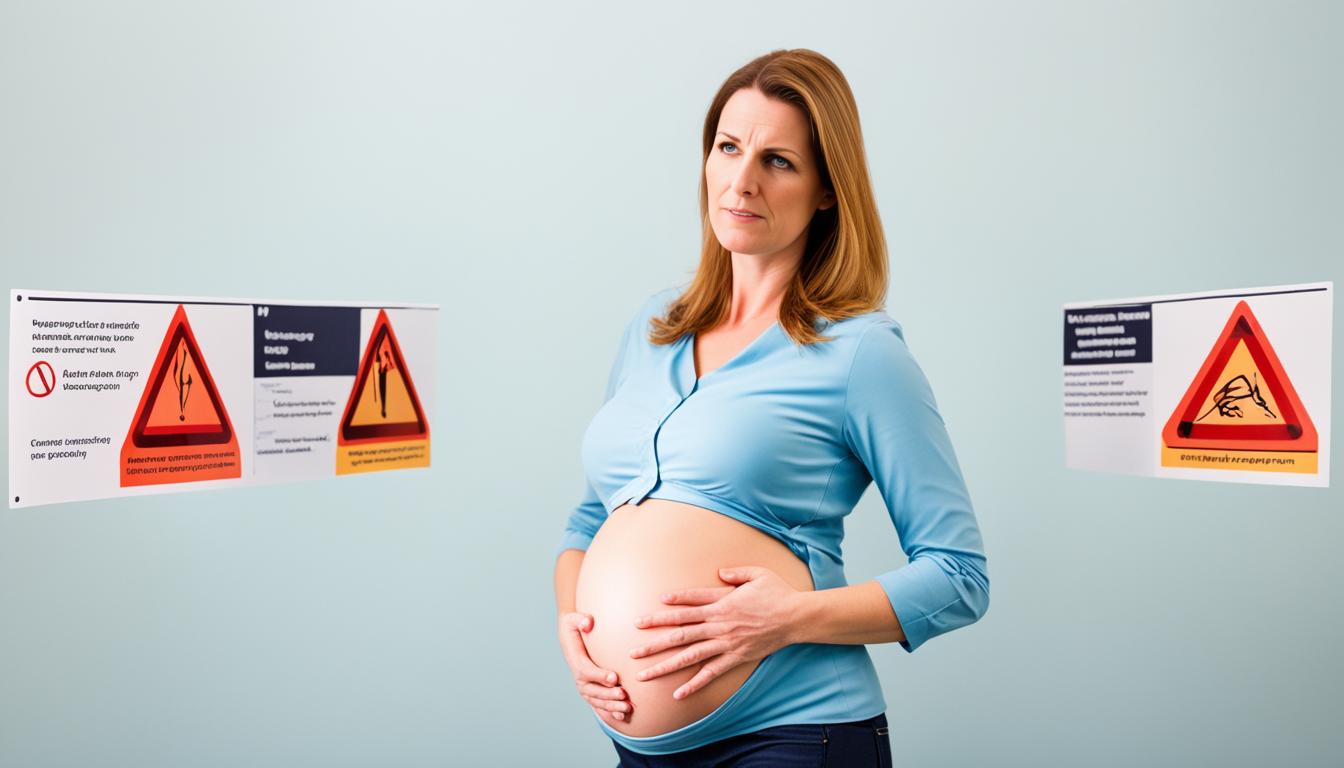For us women, the pregnancy journey brims with expectancy, happiness, and at times, a bit of concern. We look forward to every landmark event, starting from the initial confirmation of pregnancy to experiencing the gentle flutters. However, amidst this joy, it’s important to stay informed about possible complications that might occur during the early phases of pregnancy.
During the first trimester, our bodies undergo numerous changes as a new life takes shape within us. While many of these changes are perfectly normal, there are also danger signs that we need to pay attention to. Recognizing these signs and seeking immediate medical help can be crucial in safeguarding our health and the well-being of our little ones.
From experiencing spotting to facing severe abdominal pain, there are certain symptoms that should raise alarm bells. It’s essential for us to know when to reach out for help and when to share our concerns with our healthcare providers. By being proactive and vigilant, we can give ourselves the best chance of a healthy and safe pregnancy.
In this article, we will explore the common danger signs in early pregnancy, how to recognize potential problems, when to seek medical help, and steps to prevent complications. Let’s dive in and empower ourselves with the knowledge and understanding we need to navigate this beautiful yet delicate phase of our lives.
How Can I Tell if There is a Problem with My Pregnancy?
Pregnancy is a beautiful journey filled with various changes, but it’s important to be aware of potential problems that may arise. Recognizing the signs of pregnancy complications can help ensure the health and well-being of both you and your baby. Here are some key signs to watch out for:
- Decreased fetal movement: If you notice a significant decrease in your baby’s movements, it’s important to seek medical advice. While some changes in movement are normal, a sudden decrease may indicate a problem.
- Injury to the abdomen: If you experience any trauma to your abdomen, such as a fall or a direct impact, it’s essential to seek immediate medical attention. Even if you do not feel immediate pain, it’s better to be safe than sorry.
- Severe abdominal pain: Intense or persistent abdominal pain that is accompanied by other symptoms should not be ignored. It could be a sign of a serious condition that requires medical assessment.
- Bleeding from the vagina: Any amount of bleeding during pregnancy should be reported to your healthcare provider. While it may be harmless, it can also be a symptom of a more significant issue.
- Blurred vision: Vision changes, such as sudden blurriness or seeing spots, can indicate high blood pressure or preeclampsia. These conditions require prompt medical attention.
- Sudden swelling: Swelling of the face, hands, legs, or feet that appears suddenly and is accompanied by other symptoms may be a sign of a problem. It’s important to seek medical evaluation to determine the cause.
- Persistent headache: If you experience a severe headache that does not go away, especially if it is accompanied by other concerning symptoms, it’s crucial to consult your healthcare provider.
Remember, it’s always better to be cautious and seek medical advice if you have any concerns about your pregnancy. Your healthcare provider is there to support you and ensure the best possible outcomes for you and your baby.

Which Symptoms Should I Get Checked Out?
Throughout pregnancy, there are certain symptoms that should prompt you to seek medical help. These include:
- Severe nausea or vomiting
- Heavy bleeding from the vagina
- Severe abdominal pain
- Clear fluid leaking from the vagina
- Fever or chills
- Shortness of breath or a racing heart
- Pain or swelling in one leg
- Problems with emotional health lasting longer than 2 weeks
- Unusual vaginal discharge
- Weight loss
- Urgency or pain when urinating
- Swelling in the legs that doesn’t improve overnight
If you experience any of these symptoms, it’s important to contact your doctor or midwife for further evaluation and guidance.
Example Quote:
“It’s always better to be safe than sorry. Don’t hesitate to reach out to your healthcare provider if you have any concerning symptoms that could indicate a problem during pregnancy.”
We’re here to support you every step of the way.
Reasons to Seek Medical Help:
| Symptoms | Reason to Seek Help |
|---|---|
| Severe nausea or vomiting | This could be a sign of a condition called hyperemesis gravidarum, which may require medical treatment. |
| Heavy bleeding from the vagina | Heavy bleeding can indicate a potential miscarriage or other complications that need immediate attention. |
| Severe abdominal pain | Severe abdominal pain may be a sign of ectopic pregnancy or other serious conditions that require medical intervention. |
| Clear fluid leaking from the vagina | This could indicate the rupture of the amniotic sac and may require assessment to prevent infection. |
| Fever or chills | A persistent fever or chills can be a sign of infection, which needs to be evaluated and treated during pregnancy. |
| Shortness of breath or a racing heart | These symptoms may be a sign of a heart or lung condition that requires medical attention during pregnancy. |
| Pain or swelling in one leg | This could be a symptom of a blood clot, known as deep vein thrombosis, which is a serious complication requiring immediate medical care. |
| Problems with emotional health lasting longer than 2 weeks | If you experience persistent feelings of sadness, anxiety, or depression during pregnancy, it’s important to seek support from a healthcare professional. |
| Unusual vaginal discharge | Changes in vaginal discharge, such as an unusual odor, color, or consistency, may indicate an infection that needs treatment during pregnancy. |
| Weight loss | Significant or sudden weight loss during pregnancy can be a cause for concern and should be evaluated by a healthcare provider. |
| Urgency or pain when urinating | These symptoms may be signs of a urinary tract infection or other urinary issues that require medical attention during pregnancy. |
| Swelling in the legs that doesn’t improve overnight | Persistent swelling in the legs, especially if it does not improve with elevation and rest, may be a sign of a circulation problem or preeclampsia and should be evaluated by a healthcare provider. |
Warning Signs During Early Pregnancy
In the early stages of pregnancy, it’s important to be aware of the warning signs that may indicate a potential problem. If you experience any of these signs, it’s crucial to contact your healthcare provider immediately.
Signs to Watch Out For
- Severe pain or cramping in the lower abdomen: This could be a sign of an ectopic pregnancy or a miscarriage.
- Pain in the tip of one shoulder: This may indicate bleeding inside the abdomen, which requires immediate medical attention.
- Dizziness or fainting: It’s important to seek medical help as this could be a sign of a decrease in blood flow to the brain.
- Changes to vision: Blurry vision or other changes in eyesight should be evaluated by a healthcare professional.
- Sudden severe swelling in the hands, feet, or face: This may be a symptom of preeclampsia, a serious condition that requires medical intervention.
- A headache that doesn’t improve with pain-relieving medicine: This persistent headache could be a sign of high blood pressure.
- Pain under the ribs: Severe pain in the upper abdomen may indicate liver or gallbladder complications.
- Extreme itchiness of the skin: Itching, especially on the hands and feet, can be a symptom of a liver disorder called intrahepatic cholestasis of pregnancy.
- Swelling in the legs that doesn’t improve overnight: Persistent swelling in the legs could be a sign of deep vein thrombosis (DVT), a blood clot that requires immediate attention.
If you experience any of these warning signs, don’t hesitate to reach out to your healthcare provider. It’s essential to prioritize your health and the health of your baby during pregnancy.

Warning Signs in Later Pregnancy
In the later stages of pregnancy, it’s crucial to be aware of the warning signs that may arise. These signs should not be ignored as they can indicate potential complications. By recognizing these signs early on, you can seek the necessary medical attention to safeguard your health and the well-being of your baby.
Changes to Vision
One important warning sign to look out for is changes to your vision. Some women may experience flashing lights or blurry eyesight during pregnancy. These visual disturbances can be a cause for concern and may indicate an underlying issue. It’s essential to bring any changes in vision to the attention of your healthcare provider.
Sudden Severe Swelling in Hands, Feet, or Face
Another warning sign to take seriously is sudden and severe swelling in your hands, feet, or face. While swelling is common during pregnancy, excessive or rapid swelling can be indicative of preeclampsia, a serious condition that can affect both mother and baby. If you notice unusual swelling, especially if it appears suddenly, it’s essential to contact your healthcare provider without delay.
Headache That Doesn’t Improve with Pain-Relieving Medicine
Headaches are a common discomfort during pregnancy, but if you experience a persistent headache that doesn’t improve with pain-relieving medication, it may be a warning sign. A severe, unrelenting headache can be a symptom of high blood pressure or other complications. Don’t hesitate to consult with your healthcare provider to determine the cause and appropriate course of action.
Pain Under the Ribs
If you’re experiencing pain under your ribs, it’s important to bring it to your healthcare provider’s attention. This could be a sign of a liver condition or other complications requiring medical assessment and management.
Extreme Itchiness of the Skin, Especially Hands and Feet
While some itching is normal during pregnancy due to stretching skin, if you experience extreme itchiness, particularly in your hands and feet, it may indicate a liver disorder known as cholestasis. Prompt medical evaluation is essential to protect your health and the health of your baby.
Swelling in the Legs That Doesn’t Improve Overnight
Lastly, swelling in the legs that doesn’t improve overnight should not be disregarded. This persistent swelling could be a sign of a blood clot or poor circulation, which can have serious implications for both you and your baby. Contact your healthcare provider immediately if you notice this symptom.
Remember, if you experience any of these warning signs in later pregnancy, it’s crucial to contact your healthcare provider immediately. Early intervention and appropriate medical care are key to ensuring a healthy pregnancy and the best possible outcome for you and your baby.

What Will Happen When I See My Doctor or Midwife?
When you visit your doctor or midwife during pregnancy, they will conduct a thorough examination to ensure your well-being and monitor your baby’s health. They will also inquire about any symptoms you may be experiencing.
If you’re unsure about your symptoms or have any concerns, it’s essential to communicate them openly with your healthcare provider. Remember, they are there to provide you with the necessary care and support.
During your check-up, your doctor or midwife may perform various tests to assess your overall health and the development of your baby. These tests can include:
- Blood tests: to check your blood type, iron levels, and screen for any infections.
- Ultrasounds: to monitor the growth and development of your baby, as well as evaluate the placenta and amniotic fluid levels.
- Urine tests: to detect any urinary tract infections, protein, or glucose in your urine.
- Fetal monitoring: to assess the baby’s heart rate, movements, and overall well-being.
Based on the results of these tests and your individual circumstances, your doctor or midwife will determine the best course of action. This may involve additional monitoring throughout your pregnancy or even the possibility of an earlier delivery.
It’s essential to follow the recommendations of your healthcare provider to ensure a healthy pregnancy for both you and your baby.

Quote:
“Regular check-ups with your doctor or midwife during pregnancy play a crucial role in monitoring your health and well-being, as well as ensuring the optimal development of your baby.” – Dr. Emily Johnson
How Can I Avoid Pregnancy Complications?
While it’s not always possible to prevent complications in pregnancy, there are steps you can take to lower your risk. Attending all your antenatal appointments is crucial as it allows for early detection and treatment of any health issues.
Add daily appointments to the calendar; they help us track the progress of our pregnancy and ensure that both our baby and we are healthy.
Additionally, maintaining a healthy balanced diet, engaging in regular physical activity, maintaining a healthy weight, and avoiding alcohol, smoking, and drug use can contribute to a healthier pregnancy.

Avoiding alcohol, smoking, and drug use is essential, as they can harm our baby’s development and increase the risk of complications. Let’s stay away from these harmful substances and prioritize the well-being of our little one.
Remember, a healthy lifestyle during pregnancy not only benefits us but also gives our baby the best start in life.
If you have any pre-existing health conditions or a history of complications in previous pregnancies, it’s important to discuss these with your healthcare provider for appropriate management. Our healthcare provider will guide us on how to manage our condition during pregnancy and ensure the best possible outcomes for both us and our baby.
By taking these steps, we can reduce the risk of pregnancy complications and promote a healthy, happy pregnancy. Let’s prioritize our well-being and our baby’s health by following these guidelines.
Resources and Support
If you have any concerns during pregnancy, you can contact your doctor, midwife, or maternity hospital for guidance and support. Additionally, services like healthdirect and Pregnancy, Birth and Baby offer resources and support through helplines and online platforms. Maternal child health nurses are also available to provide guidance and answer questions. It’s important to reach out for support if you have any worries or questions about your pregnancy.
Bleeding and Spotting in Pregnancy
Bleeding and spotting can occur during pregnancy, and while they may not always indicate a problem, it’s essential to understand their potential causes and implications. About 25% of pregnant women experience some form of bleeding or spotting, which can be attributed to various factors. However, it’s important to remember that these symptoms can also be signs of complications or even miscarriage. If you experience bleeding or spotting, it’s crucial to contact your healthcare provider for a thorough evaluation and appropriate management.
There are several possible causes of bleeding and spotting during pregnancy. These include:
- Implantation: Light bleeding or spotting can occur when the fertilized egg attaches to the lining of the uterus.
- Hormone changes: Fluctuations in hormone levels can cause vaginal bleeding or spotting.
- Infections: Certain infections, such as urinary tract infections or sexually transmitted infections, may lead to bleeding or spotting.
- Certain tests during pregnancy: In some cases, diagnostic tests like a pelvic exam or a transvaginal ultrasound may cause minor bleeding or spotting.
- Complications: Serious conditions like ectopic pregnancy or molar pregnancy can cause bleeding or spotting, which necessitates immediate medical attention.
If you experience bleeding or spotting during pregnancy, contact your healthcare provider promptly. They will evaluate your symptoms, conduct necessary tests, and provide appropriate guidance and management tailored to your specific situation.

Communicating Danger Signs and Complications
At [brand name], we understand the importance of effectively communicating pregnancy danger signs and complications. It is crucial for the well-being of expectant mothers, their families, and the broader community. By educating individuals about the signs and symptoms of complications, we aim to empower them to take prompt action and seek timely care.
When discussing pregnancy danger signs, it is essential to use clear language and familiar terms that resonate with the audience. By avoiding medical jargon and using local words and explanations, we can improve understanding and recognition of these signs. Our goal is to ensure that every person, regardless of their background or education, can easily identify potential danger signs and seek help when needed.
In addition to educating individuals, we believe in the power of collaboration. By working together with other healthcare providers and community groups, we can raise awareness and reach a larger audience. Through partnerships and joint initiatives, we can ensure that accurate information about danger signs and complications reaches as many people as possible.
Supporting Birth and Emergency Plans
One way we support individuals in recognizing danger signs and complications is by providing guidance in developing birth and emergency plans. These plans outline the necessary steps to take in case of an emergency, including who to contact and where to seek immediate care. By encouraging individuals to create these plans, we equip them with the tools to respond effectively in critical situations.
“Preparing for emergencies can save lives. By educating individuals about pregnancy danger signs and complications, we empower them to protect their health and the health of their babies.” – [Expert Name], [Title]
Community Outreach and Awareness
Community outreach plays a vital role in ensuring that the message about pregnancy danger signs and complications reaches all individuals. Through workshops, seminars, and informational campaigns, we strive to raise awareness and educate community members about the importance of seeking timely care. By engaging with the community and providing culturally sensitive and relevant information, we contribute to a healthier and safer pregnancy experience.
Collaboration in Action
| Partnerships | Activities | Impact |
|---|---|---|
| [Hospital Name] | Joint educational workshops for expectant mothers | Increased awareness and early detection of complications |
| [Community Organization] | Distribution of informational brochures in local communities | Improved knowledge and recognition of danger signs |
| [Health Agency] | Collaborative social media campaign | Widespread dissemination of information to a larger audience |
By actively engaging with healthcare providers, community organizations, and government agencies, we can work together to ensure that the message about pregnancy danger signs and complications is effectively communicated to all individuals. Together, we can make a difference in promoting healthier pregnancies and reducing the risk of complications.

Conclusion
Recognizing danger signs and complications during pregnancy is vital for ensuring the health and well-being of both the mother and the baby. By being aware of the warning signs and seeking prompt medical help, potential complications can be detected and managed effectively. It’s crucial for women, their families, and the community to have access to accurate information and support in order to respond appropriately during pregnancy.
Remember, if you experience any concerning symptoms, don’t hesitate to contact your healthcare provider for guidance and care. Seeking medical help promptly can make all the difference in ensuring a healthy pregnancy and positive outcomes for both the mother and the baby.
With the right knowledge, resources, and support, we can work together to prioritize the well-being of expectant mothers and promote a safe and healthy pregnancy journey for all.
Should I be Concerned about Spotting during Early Pregnancy if I Notice Changes in Poop Color during the First Trimester?
Spotting during early pregnancy is common, but changes in poop color may warrant a doctor’s visit. Monitoring poop color changes in pregnancy is important, as it could indicate potential issues. It’s best to get any unusual symptoms checked out for peace of mind.
FAQ
What are some danger signs of pregnancy during the first trimester?
Some danger signs of pregnancy during the first trimester include bleeding from the vagina, severe abdominal pain, blurred vision, swelling, and a bad headache that doesn’t go away. If you experience any of these symptoms, it’s crucial to seek immediate help.
How can I tell if there is a problem with my pregnancy?
Signs that may indicate a problem with your pregnancy include decreased fetal movement, an injury to the abdomen, severe abdominal pain, bleeding from the vagina, blurred vision, sudden swelling, and a persistent headache. It’s best to get any concerns checked out by your doctor or midwife.
What symptoms during pregnancy should I get checked out?
Symptoms during pregnancy that should prompt you to seek medical help include severe nausea or vomiting, heavy bleeding from the vagina, severe abdominal pain, clear fluid leaking from the vagina, fever or chills, shortness of breath or a racing heart, pain or swelling in one leg, problems with emotional health lasting longer than 2 weeks, unusual vaginal discharge, weight loss, urgency or pain when urinating, and swelling in the legs that doesn’t improve overnight. Contact your doctor or midwife if you experience any of these symptoms.
What are the warning signs during early pregnancy?
Warning signs during early pregnancy that should not be ignored include severe pain or cramping in the lower abdomen, pain in the tip of one shoulder, dizziness or fainting, changes to vision, sudden severe swelling in the hands, feet or face, a headache that doesn’t improve with pain-relieving medicine, pain under the ribs, extreme itchiness of the skin, and swelling in the legs that doesn’t improve overnight. If you experience any of these signs, contact your healthcare provider immediately.
What are the warning signs in later pregnancy?
Warning signs in later pregnancy that should not be ignored include changes to vision such as flashing lights or blurry eyesight, sudden severe swelling in the hands, feet, or face, a headache that doesn’t improve with pain-relieving medicine, pain under the ribs, extreme itchiness of the skin (especially hands and feet), and swelling in the legs that doesn’t improve overnight. If you experience any of these signs, contact your healthcare provider immediately.
What will happen when I see my doctor or midwife?
When you see your doctor or midwife, they will ask about your symptoms and perform an examination. They may also conduct tests such as blood tests, ultrasounds, urine tests, and fetal monitoring to check your and your baby’s health. Your doctor or midwife will determine the appropriate treatment based on your individual circumstances and the cause of your symptoms.
How can I avoid pregnancy complications?
To lower your risk of pregnancy complications, attend all your antenatal appointments for early detection and treatment of any health issues. Maintain a healthy balanced diet, engage in regular physical activity, maintain a healthy weight, and avoid alcohol, smoking, and drug use. If you have any pre-existing health conditions or a history of complications in previous pregnancies, discuss these with your healthcare provider for appropriate management.
Where can I find resources and support during pregnancy?
If you have any concerns during pregnancy, you can contact your doctor, midwife, or maternity hospital for guidance and support. Services like healthdirect and Pregnancy, Birth and Baby offer resources and support through helplines and online platforms. Maternal child health nurses are also available to provide guidance and answer questions.
What causes bleeding and spotting during pregnancy?
Bleeding and spotting can occur during pregnancy and may not always indicate a problem. Causes of bleeding and spotting can vary, including implantation, hormone changes, infections, certain tests during pregnancy, and complications like ectopic pregnancy or molar pregnancy. It’s important to contact your healthcare provider if you experience bleeding or spotting for evaluation and appropriate management.
How can danger signs and complications during pregnancy be effectively communicated?
It is crucial to effectively communicate danger signs and complications during pregnancy by discussing the signs, emphasizing the importance of seeking timely care, and providing support in developing birth and emergency plans. Clear communication in familiar terms, using local words and explanations, can help improve understanding and recognition of danger signs. Working with other healthcare providers and community groups can also raise awareness and ensure that all individuals have the necessary information to respond to a potential emergency.
Why is it important to recognize danger signs and complications during pregnancy?
Recognizing danger signs and complications during pregnancy is vital for ensuring the health and well-being of both the mother and the baby. By being aware of the warning signs and seeking prompt medical help, potential complications can be detected and managed effectively. Access to accurate information and support is essential for individuals to respond appropriately during pregnancy. If you experience any concerning symptoms, don’t hesitate to contact your healthcare provider for guidance and care.









